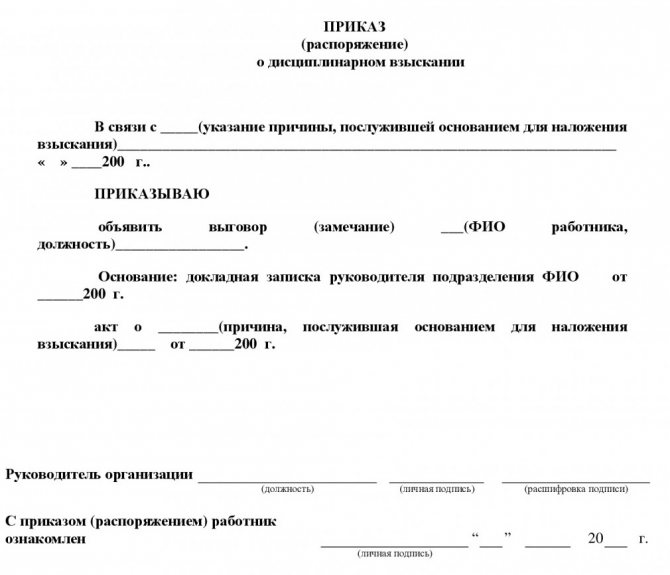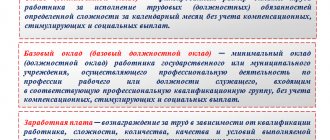If an employee is guilty, but not enough to be fired, this does not mean that his misconduct should go unpunished. There is a special form of responsibility - disciplinary, the function of which is to make a person think about his violation and correct his approach to work in the future. How to properly influence violators of labor discipline, what measures are used for this, what is the procedure for applying disciplinary sanctions, read the article below.
to make a record of a reprimand in the work book (information about work activity) ?
Punishment for wrongdoing
If the manager decides not to fire the offending employee, the law provides him with only two permitted levers of influence:
- remark - the least strict form;
- reprimand is a form of discipline preceding dismissal.
IMPORTANT! The legislation does not allow any lighter or more aggravated forms of disciplinary action, such as “warning of a reprimand”, “reprimand entered into a personal file”, etc.
An exception to this rule is some positions for which there are additional penalties not described in the Labor Code. Civil servants, for example, may receive a warning that they do not fully comply with their position, and customs officers and internal affairs officers, in addition to this, risk being subject to a severe reprimand.
to reprimand an employee for refusing to undergo a mandatory periodic medical examination , and then dismiss him if he refuses to undergo a medical examination again?
Consequences of a severe reprimand
Announcing a severe reprimand implies a number of negative consequences:
- During the period of its validity, the punished person may not be subject to any incentive measures other than the removal of a previously imposed severe reprimand.
- The period of validity of a strict reprimand does not count towards the period required for the assignment of the next military or special rank.
- A military serviceman or law enforcement officer is deprived of bonuses and other incentive payments that are due for conscientious service.
A severe reprimand is a kind of final warning to a violator of discipline. Since if he does not take action, further and more severe punishments imply extremely negative consequences. For example, a serviceman may be demoted in rank or military position, and a cadet at a military educational institution may be expelled from it.
If you want more stringent measures
Alternative measures of influence on guilty employees, not provided for by the Labor Code of the Russian Federation, are unacceptable. For violations of employee discipline, it is not permitted to:
- demote;
- impose a fine;
- reschedule or cancel their vacation;
- withhold part of the salary, etc.
If the labor inspectorate, as a result of an inspection or complaint, reveals any form of punishment for a disciplinary offense, other than a reprimand or reprimand, the employer will receive an order for a serious fine, and the penalty imposed on the employee will have to be removed.
ATTENTION! If money is illegally withheld from an employee as punishment, then upon appeal, the employer will not only be obliged to return it, but also to pay a penalty for the delay in wages.
The only form of punishment more severe than a reprimand and reprimand is the dismissal of the offending employee, if the reason for this is sufficient.
Types and general conditions for applying disciplinary sanctions
Important! Please keep in mind that:
- Each case is unique and individual.
- A thorough study of the issue does not always guarantee a positive outcome. It depends on many factors.
To get the most detailed advice on your issue, you just need to choose any of the options offered:
- Use the online chat in the lower corner of the screen.
- Call: Federal number: +7 (800) 511-86-74
Most likely, the manager mentioned the special severity of the punishment in a fit of justified anger. As soon as the emotions recede, the director will remember the contents of the article. 192 of the Labor Code stating that this type of punishment is not provided for commercial and municipal institutions. In general, an employee may be afraid of:
- comments;
- reprimand;
- dismissals.
The code does not detail the difference between a remark and a reprimand. But, based on simple logic and application practice, we can conclude that the penalties in Art. 192 TCs are listed in order of increasing impact.
Then we can assume that a reprimand is issued for minor offenses (lateness, short-term absence from the workplace, minor mistakes or oversights that did not lead to serious problems, but are potentially dangerous). At the same time, the owner of a written remark should not relax, because:
- This is a full disciplinary sanction;
- its validity will last exactly one year unless canceled early;
- in paragraph 5 of Art. 81 it makes no difference what type of punishment the employee already has, a reprimand or a severe reprimand; the very fact that the punishment is still in force is enough for dismissal.
At the same time, many employees, subconsciously equating only the concepts of a severe reprimand and dismissal, are voluntarily mistaken. The fact is that, according to the norms of the Labor Code of the Russian Federation, you can lose your job as a result of just one outstanding simple, rather than severe, reprimand. Or it is possible without going through this stage at all if the employee committed a very serious violation (absenteeism, drunkenness, theft, inappropriate behavior, etc.).
During the period of validity of the disciplinary sanction, the employee risks being dismissed for the fact of repeated failure to fulfill labor duties, clause 5 of Art. 81 TK. (read more about how long a severe reprimand lasts).
What can you “reprimand” for?
The employer chooses punishment (disciplinary liability) that is appropriate to the offense. There are certain official duties that must be performed properly; non-fulfillment or not fulfilled to the fullest extent and quality is considered a violation. Inaction is also punishable when the job function requires activity. A violation will also be disrespect for the rules of internal labor discipline and routine. It is these forms of behavior that are meant by a disciplinary offense (Article 192 of the Labor Code of the Russian Federation).
Those rules, the violation of which may entail liability, must be documented in the job description, employment contract or internal regulations.
FOR YOUR INFORMATION! The rules written out in the listed documents are binding only if the procedure for familiarizing the employee with them has been carried out, which is confirmed by his signature.
For example, if a person is late for his shift, while the work schedule is posted in the lobby, this cannot be officially recognized as a violation, because no one obliges employees to familiarize themselves with the materials posted on the walls. But if the worker signed the words “I have read the schedule,” the resulting liability will be legitimate.
Reasons for reprimand:
- being late to start work or after a break;
- absence on site;
- refusal to undergo safety training or medical examinations;
- appearing in an indecent state;
- embezzlement, damage, theft of company or employer property;
- failure to comply with management orders;
- violation of labor functions.
The PVTR of the organization established that employees must behave tactfully with the team. If an employee is rude to a colleague, it means he has violated discipline and can be held accountable. View the court decision
Reasons for removal and types
At the moment, the legislation of the Russian Federation does not distinguish certain types of reprimands at work, as in the years under the USSR. There is no legal concept of “severe reprimand”, so familiar in everyday life. The employer can only issue a reprimand or reprimand or dismiss. There is no intermediate type of penalty between a reprimand and dismissal.
A citizen needs to understand that a specific list of things for which one can be reprimanded at work is not spelled out in regulations. In virtually every case, an analysis of the employee’s actions is carried out. The most common reasons:
- repeated absenteeism and tardiness;
- failure to fulfill official duties;
- failure to meet deadlines;
- performing work with manufacturing defects, etc.
Important! A reprimand cannot be declared on the basis of a subjective assessment of work, that is, it is necessary to record and prove failure to fulfill duties regulated by instructions or regulations.
It would be unlawful to reprimand an employee for refusing to work overtime if such an obligation is not specified in the job description. Similarly, refusal to do work of a different nature will not be considered a failure to fulfill duties. An accountant cannot be reprimanded for failing to clean the premises, since cleaning is not part of the job responsibilities of an accounting employee.
Time to discipline the offender
The employer has one month from the day the violation was reported to him to decide whether certain measures are necessary.
If the culprit falls ill during this month or goes on vacation of any kind, these days are added to the period allotted for disciplinary measures. But when additional days of rest are provided by the state, for example, holidays or weekends, the monthly period is not extended for this time.
Two weeks passed between the facts of non-fulfillment of labor duties, but they were revealed almost simultaneously. The employee was reprimanded for the first violation, and the next day he was fired for the second. View the court decision
If the immediate supervisor has not learned about the misconduct for more than six months, no matter what circumstances emerge in the future, the statute of limitations is considered to have passed, and the perpetrator can no longer be reprimanded.
IMPORTANT! The period for detecting a violation is extended to 2 years if the violation was discovered as a result of an audit or audit.
Difference between a reprimand and a severe reprimand
The legislation does not contain an exhaustive list of offenses for which a reprimand, as well as a severe reprimand, can be imposed.
Subscribe to our newsletter
Yandex.Zen VKontakte Telegram
Therefore, a severe reprimand is assigned for the same offenses as a reprimand if they are committed repeatedly, systematically, or against employees who already have an outstanding reprimand.
That is, strictly formally, the first time a person guilty of a disciplinary offense must be reprimanded, and if before the revocation of the offense the offense is repeated or other disciplinary offenses are committed, then a severe reprimand is applied to him.
If a severe reprimand does not produce results, then an even more severe penalty will be applied to the violator of discipline, for example, a warning about incomplete compliance with the position held.
Repented, improved
If a year has passed and no new records of penalties have been added to your personal card, the heavy burden of punishment is automatically removed.
IMPORTANT! If 365 days have not yet passed, and labor discipline is again violated, this may become a legal basis for dismissal.
If the employer decided before the expiration of the one-year period that the employee had reformed (whether he made such a decision himself, or the punished person requested this), the reprimand can be lifted early. To do this, it is enough to issue an appropriate order. After it comes into force, it is considered that the employee has no disciplinary sanctions.
How can an employee appeal a reprimand ?
Drawing up an order in compliance with current regulations

How to properly document a reprimand to an employee who violates labor regulations?
We begin to draw up a document through which the procedure for issuing a reprimand is documented. This is the appropriate order. Here is an example of how to compile this document.
The full name of the organization is indicated in the header of the order. Just below it is written: “Order No.” and the corresponding number is indicated.
Further, under the heading, it is written: “On the imposition of a disciplinary sanction on...” (the full last name, first name, patronymic of the employee are indicated here).
Then, depending on the type of violation, the following is prescribed: “Impose a disciplinary sanction in the form of a reprimand for failure to fulfill functional duties regulated by the employment contract without good reason.” The wording here can be very different, it all depends on the type of disciplinary violation committed by the employee.
Further, various types of grounds for issuing a reprimand may be indicated.
For example, if a reprimand is announced because an employee is systematically late for work, you can indicate acts of lateness for work (with recording of specific numbers entered in such acts).
In addition, you can reflect information about the presence (or absence) of a written explanation provided by the employee.
The order is completed by the signature of the head of the enterprise and the signature of the employee against whom the reprimand is issued. The corresponding date is indicated.
What to do with the work book of such an employee? Is it recorded here that such a disciplinary measure was announced against him?
The law explains the following. If such facts are systemic in nature (that is, if reprimands are issued against a given employee on an ongoing basis for objective reasons), then the relevant information is entered into the work record book.
And, on the contrary, when an incident involving a reprimand is only an isolated case, the employee’s work record book remains “clean”, the employer does not record in it the single fact of this disciplinary sanction.
Documentation of collection
The procedural requirements for the application of any disciplinary sanction, including a reprimand, are identical (Article 193 of the Labor Code of the Russian Federation). The employer or administration representative must perform a specific algorithm of actions:
- Record the fact of violation. Recording can occur by drawing up an act immediately on the spot or through the submission of a memo by the immediate supervisor to higher authorities.
- Draw up an act requiring the guilty employee to provide an explanation of the reason that led to the commission of the offense.
- Wait for a response from the employee. The employee is given 2 days to submit an explanatory statement.
- Analyze the received answer. If the explanatory note was never submitted, then record in an act the employee’s refusal to provide an explanation, or lack of response to the request.
- Make a decision on the need to impose penalties. Select the type of collection.
- Prepare a reprimand order.
- Familiarize the employee with the order. The period for review is 3 days. If an employee refuses to sign, a corresponding document must be drawn up.

In the algorithm prescribed by law, it is important to comply with the deadlines and procedure. In case of violation, the penalty can be appealed by the employee. To make a decision, the employer has a month from the moment the employee committed or discovered the commission of an offense. The maximum period is 6 months, which can be used if it is impossible to impose a penalty for objective reasons. An exception is detection as a result of a control and audit inspection. Then the period increases to two years.








